Key takeaways:
- Activist burnout results from the emotional toll of relentless advocacy work, highlighting the need for self-care as an essential part of activism.
- Reparations politics can revitalize activists by offering a framework that emphasizes healing and community solidarity, shifting focus from mere protest to constructive solutions.
- Recognizing signs of burnout, such as detachment from community or waning enthusiasm, is crucial for addressing emotional exhaustion and re-engaging with activism.
- Building a support network and collaborating with others can provide relief, foster connections, and reignite passion for social justice causes.
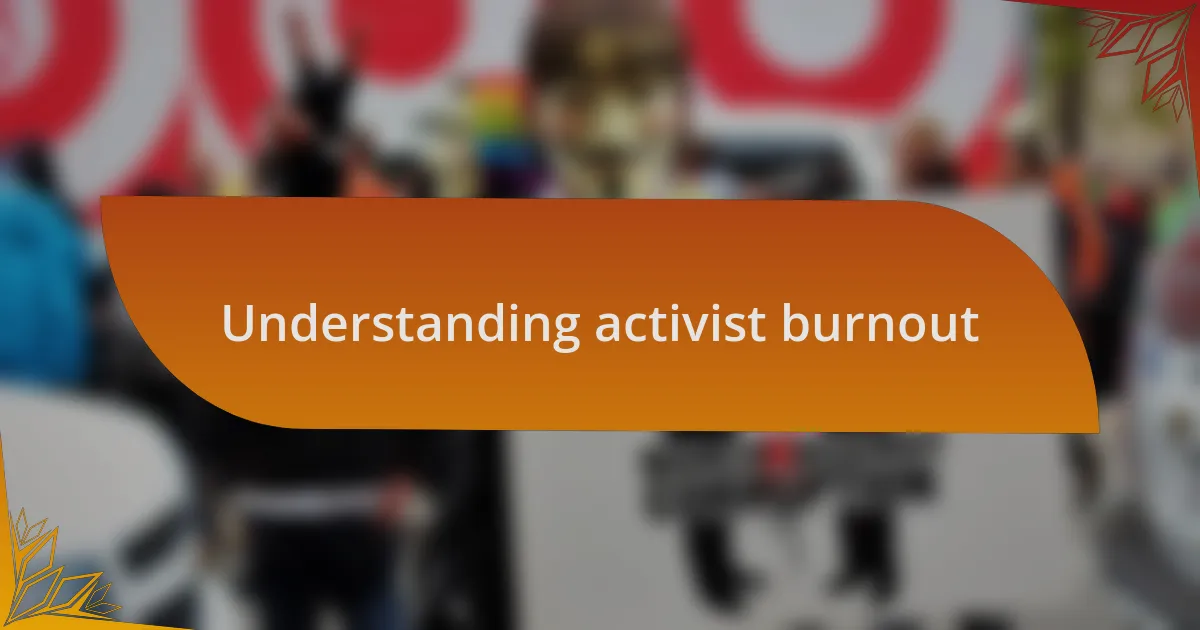
Understanding activist burnout
Activist burnout is a profound emotional and physical exhaustion that often results from the relentless demands of advocacy work. I’ve experienced this firsthand, where the weight of unending campaigns and social justice battles left me feeling depleted and questioning my own commitment. Have you ever found yourself dragging your feet to attend a meeting or feeling overwhelmed by just the thought of yet another protest?
As I’ve navigated this experience, I’ve come to realize that burnout isn’t just about being tired; it’s about the emotional toll that can sap your passion for change. When I started to feel detached from the movements I once thrived in, it was a wake-up call. I began to wonder: What happens when our passion turns into pressure, and how does that affect the very causes we fight for?
Understanding the cyclical nature of burnout, I’ve learned that it often arises from a combination of high expectations and the emotional weight of injustice. It’s not uncommon to feel like you’re carrying the world on your shoulders, but recognizing this feeling is the first step to reclaiming your energy and enthusiasm. What if we shifted our perspective to see self-care not as a luxury, but as a necessary part of being effective activists?
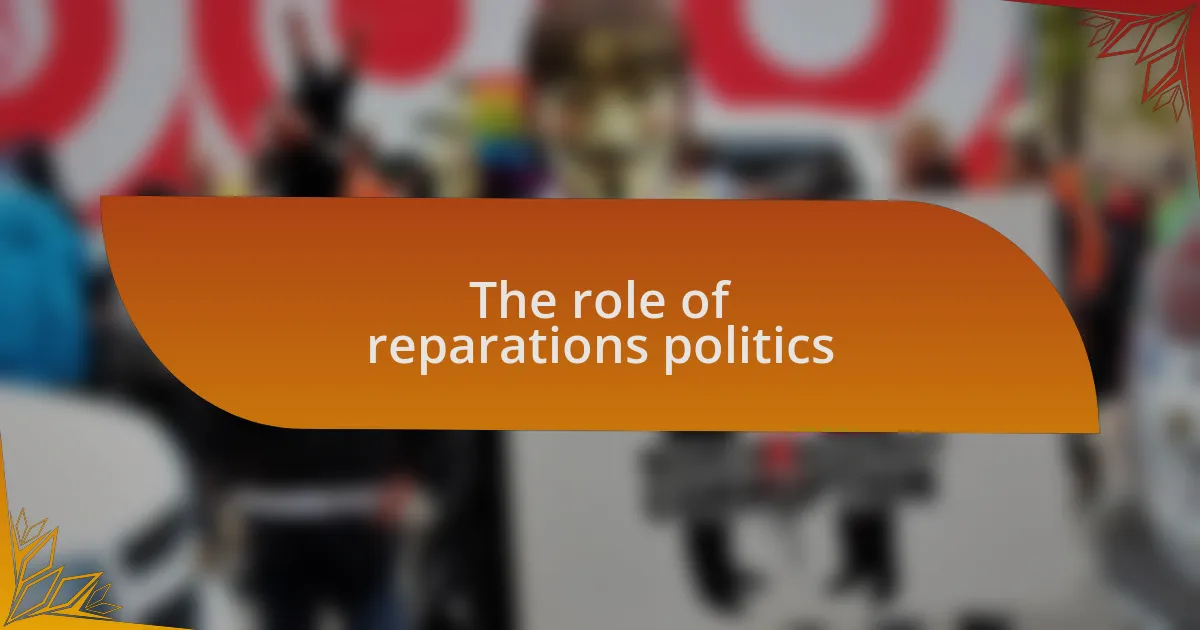
The role of reparations politics
Reparations politics plays a crucial role in addressing long-standing injustices that fuel activist burnout. When the fight for reparations is grounded in acknowledgment of historical wrongs, it can reinvigorate our sense of purpose. I remember a particularly intense campaign where the focus on reparations made our collective efforts feel like not just fighting against oppression, but actively building towards healing and justice.
Engaging in reparations work provides a tangible framework through which we can channel our frustrations and hopes. During those moments when the weight of advocacy felt unbearable, centering our discussions around reparative measures helped me see the light at the end of the tunnel. It’s easy to become disillusioned when facing systemic issues, but by highlighting specific reparative actions, we can redirect our energies towards constructive solutions rather than just persistent struggles.
Moreover, reparations politics invites a communal healing aspect that resonates deeply with many activists. The conversations I’ve had with others about reparative justice often spark a renewed energy, as we share stories of resilience and build a sense of solidarity. Why is it that talking about compensation and justice feels less exhausting than merely protesting? Perhaps it’s because reparations remind us that the fight is about more than survival; it’s about thriving and creating a future that acknowledges past wounds.
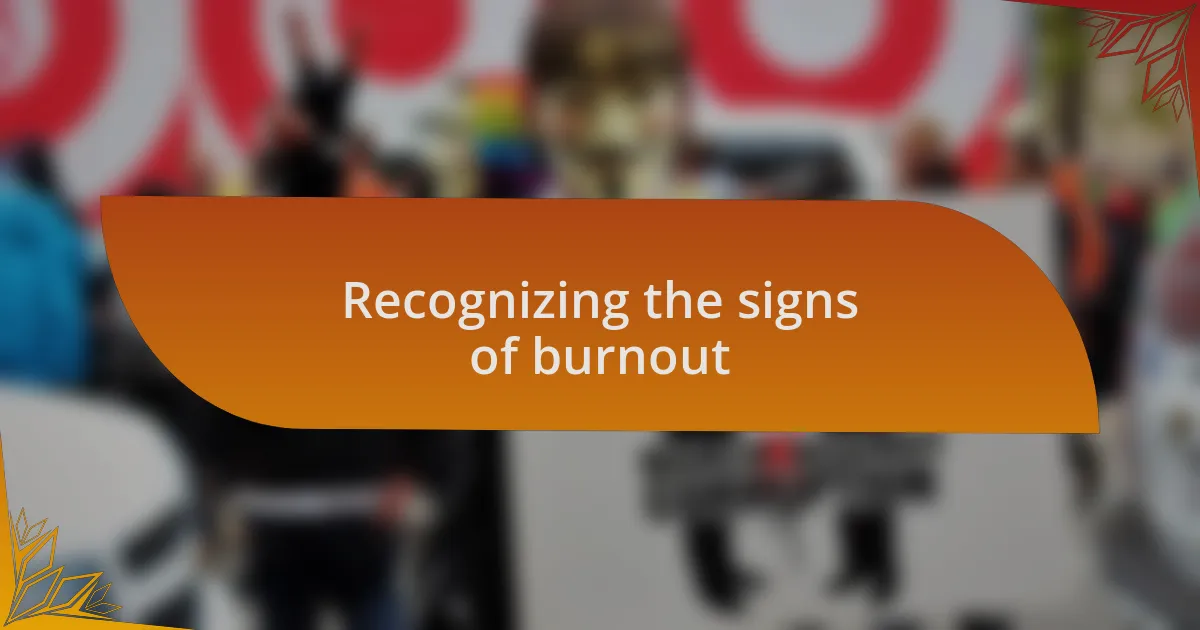
Recognizing the signs of burnout
Burnout can often creep up on activists, manifesting in various subtle ways. For instance, I’ve noticed when my enthusiasm for meetings starts to wane or when I feel physically drained after merely thinking about our next campaign, it’s a clear red flag. Have you ever found yourself dreading the topics you once felt passionate about? That’s a sign your spirit might be in need of some tender care.
One identifiable symptom of burnout is the sense of being overwhelmed by the constant barrage of information and news, especially regarding injustices. When I found myself scrolling through updates feeling numb rather than motivated, I realized that my emotional reserves were nearly depleted. Isn’t it funny how we can become so desensitized that we lose sight of why we began advocating in the first place?
Additionally, feeling detached from the community can signal that burnout is setting in. I recall a time when I attended an event but felt like an outsider looking in rather than a part of the collective. If you ever experience such a disconnection, it’s essential to pause and reflect—could this be a sign that you need a break or a change in perspective? Listening to these signals can be the first step toward finding your way back to a place of empowerment and engagement.
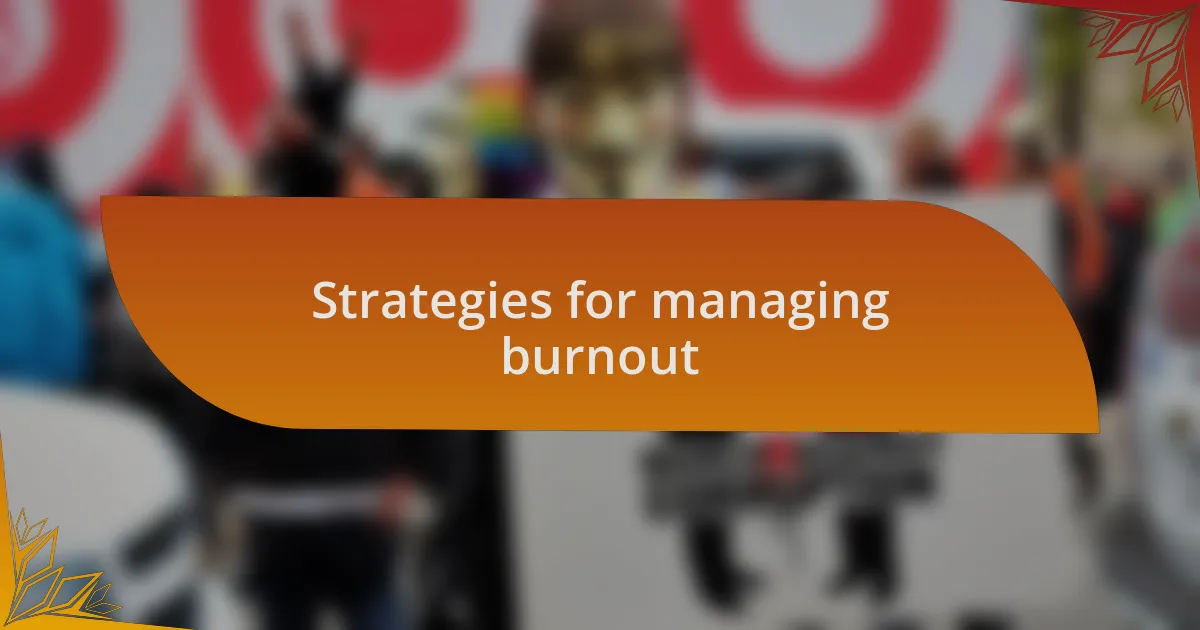
Strategies for managing burnout
It’s vital to prioritize self-care when navigating burnout. I’ve found that setting aside specific times for rest can be transformative. Sometimes, all it takes is a quiet afternoon with no agenda to recharge my spirit. Have you ever noticed how just a few moments of solitude can help clarify your thoughts and feelings?
Connecting with others who share similar experiences often brings relief, too. During one particularly draining period, I joined a support group where we shared our struggles and triumphs. This communal experience not only validated my feelings but also gave me fresh perspectives and renewed motivation. Don’t underestimate the power of camaraderie; could it be that sharing your burden lightens the load?
Lastly, practicing mindfulness techniques has proven indispensable for managing burnout. I remember starting a simple breathing exercise that I now incorporate into my daily routine. Taking just five minutes to focus on my breath centers me and helps alleviate that overwhelmed feeling. Have you tried similar practices? They might be the key to returning to that proactive mindset that fuels your activism.
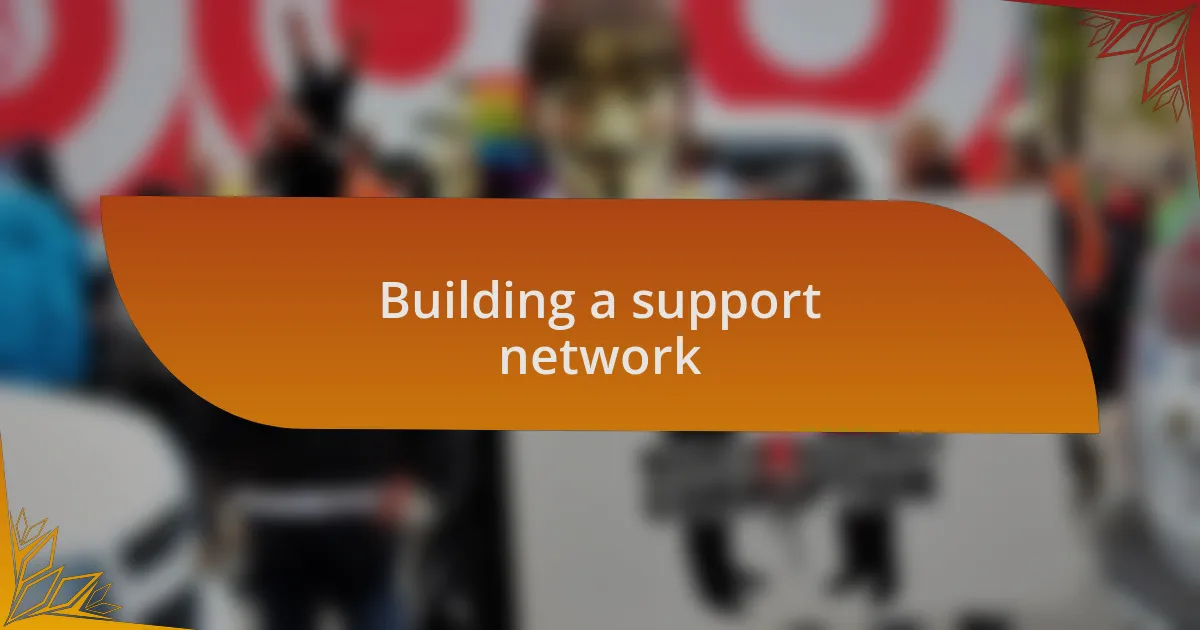
Building a support network
Finding a support network starts with reaching out to those around you. I remember feeling isolated during a particularly challenging campaign, so I decided to invite a few friends over for coffee to discuss our experiences. This simple gathering turned into a vibrant exchange that not only reinforced our connections but also reminded us that we’re not alone in our struggles.
Beyond friends, I’ve discovered that online platforms can also serve as a lifeline. There was a time when I felt extremely burnt out and hesitant to engage with others. But when I joined an online community focused on reparations and activism, I found a diverse group of individuals who shared their stories. It was eye-opening to see how many people were navigating similar challenges, and engaging with them lifted my spirits. Have you thought about exploring these virtual spaces?
Lastly, I urge anyone navigating activist burnout to consider forming intentional partnerships. Collaboration has played a significant role in my recovery. Just last month, I partnered with a fellow activist on a local project, and it reignited my passion while providing much-needed support. What’s more empowering than working alongside others who are equally invested? Building a support network isn’t just helpful; it’s essential for sustaining our activism.
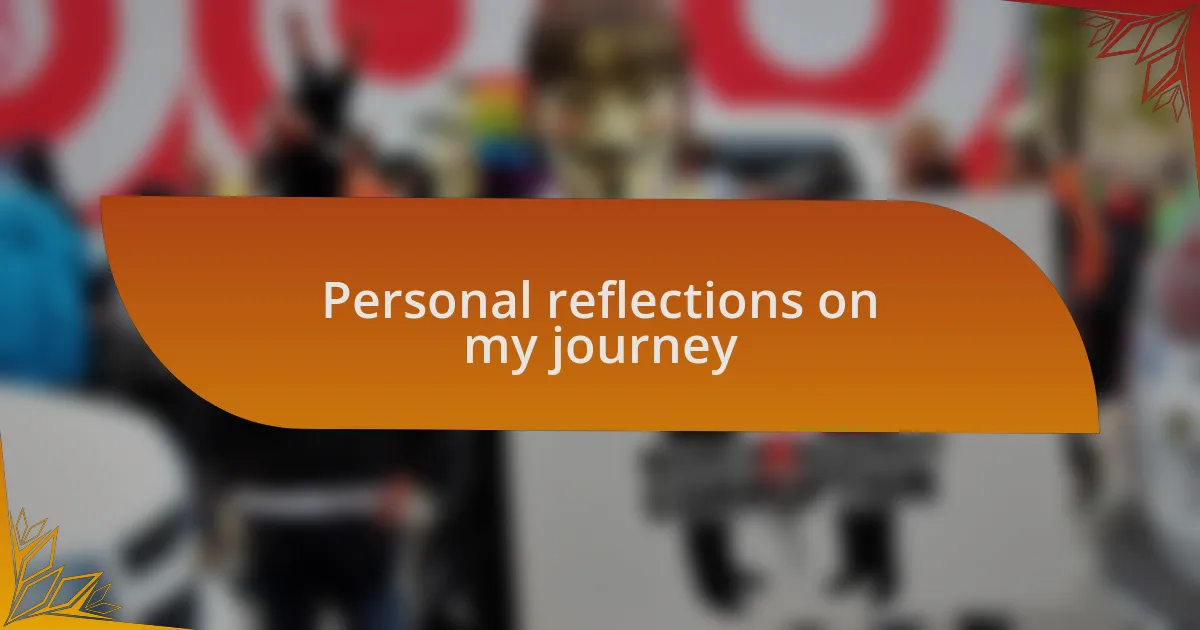
Personal reflections on my journey
Reflecting on my journey through activism, I’ve come to appreciate how vulnerability can be a source of strength. There was a moment when I shared my feelings of burnout during a community meeting, and to my surprise, others opened up about their own struggles. This exchange not only fostered deeper connections but also reminded me that admitting our limitations can be an act of courage.
One particularly challenging period came when I felt utterly exhausted after a major campaign. I recall sitting on my couch, staring at the walls, wondering if this was the end of my activism journey. But then, I decided to pen down my thoughts in a journal, which transformed into a space for reflection and clarity. I started to unravel my feelings and, through that, discovered ways to reignite my commitment. Have you ever considered writing as a tool for self-discovery?
I’ve also learned that celebrating small victories is essential. Last spring, I attended a community event where we shared our accomplishments, however minor they seemed. Listening to others recount their progress inspired me to acknowledge my own milestones—like organizing a workshop that had only a handful of participants but sparked meaningful dialogue. It reinforced the idea that every step, no matter how small, can contribute to the greater cause. How do you celebrate your victories, and have they helped stave off feelings of burnout?
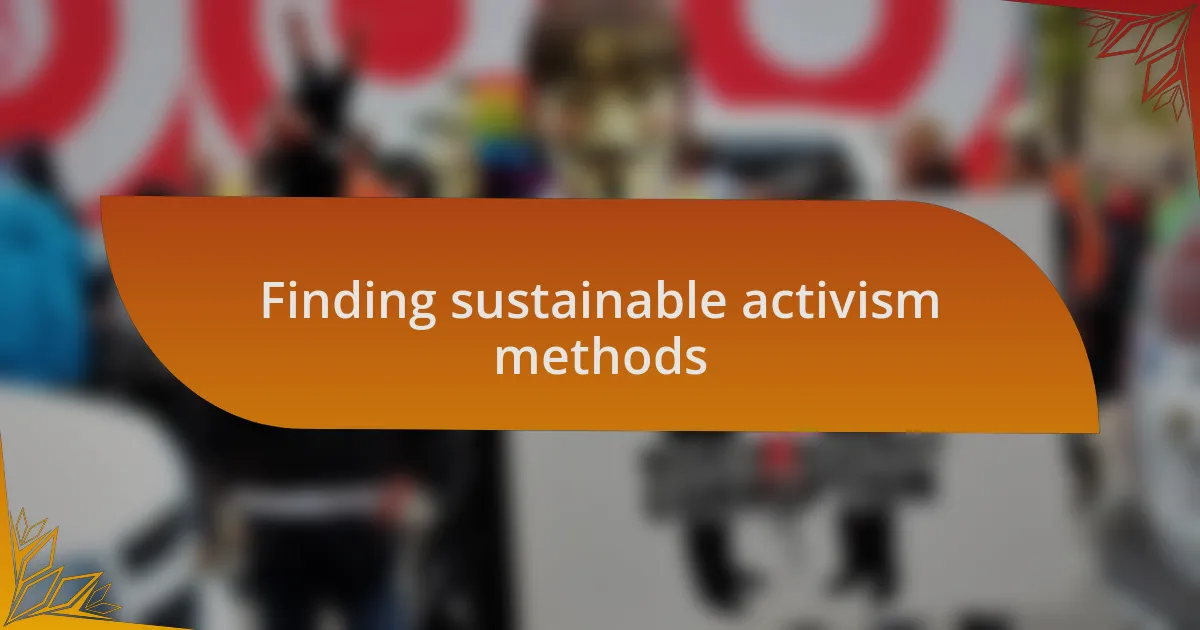
Finding sustainable activism methods
Finding methods that allow for sustainable activism is crucial in maintaining our energy and passion. I remember during a particularly busy month, I dedicated a Sunday just for self-care—no emails, no meetings, just time to recharge. This intentional pause was a game changer, reminding me that stepping back can actually propel us forward with renewed vigor. Have you ever let a weekend just be about you?
Balancing activism with personal life can feel daunting, but I’ve discovered that integrating activism into everyday activities makes it manageable. For instance, I started volunteering with a local organization during my lunch breaks instead of committing to long weekend events. This shift not only kept me engaged but also allowed me to connect with others in my community without the overwhelming pressure of a massive time commitment.
Another strategy I’ve embraced is the power of collaboration. When I teamed up with fellow activists for a joint initiative, I found that shared responsibilities lightened the load. It was refreshing to brainstorm ideas together, which fueled our creativity and avoided the exhaustion that often comes from going solo. Have you ever considered teaming up? It can turn the struggle into a shared journey, making activism less isolating and more invigorating.